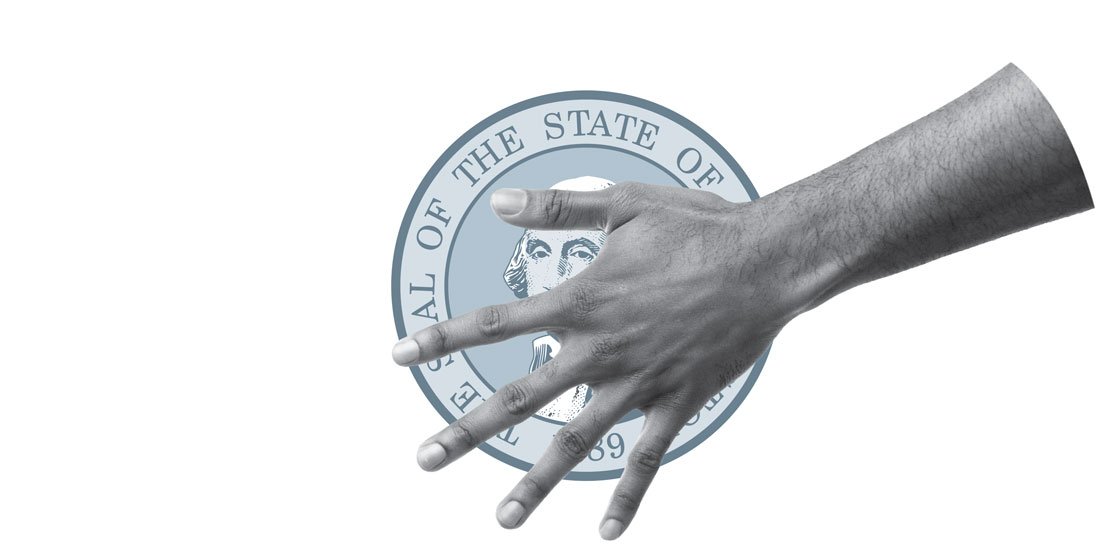
Your Right to Know Report
Perspectives | 13
The following essays represent the analysis and viewpoints of their authors.
Finding 5: The Public Records Act Needs to Hold Officials Accountable
Few Consequences for Those Who Ignore Transparency Laws
For the Public Records Act to have real strength, Washington needs a law, like some other states, where agency officials or office holders are held personally accountable for violating disclosure rules.
Washington’s Public Records Act (PRA) is often heralded as one of the strongest, on paper, in the nation. But its strength is often paper thin, and largely fictional, due to flaws in its drafting and application. First, only “agencies” can violate the PRA -- or likely be sued by the public for violations of the act.
It is a felony for an individual to destroy or hide a public record pursuant to RCW 40.16.010, available at https://app.leg.wa.gov/rcw/default.aspx?cite=40.16.010:
Every person who shall willfully and unlawfully remove, alter, mutilate, destroy, conceal, or obliterate a record, map, book, paper, document, or other thing filed or deposited in a public office, or with any public officer, by authority of law, is guilty of a class C felony and shall be punished by imprisonment in a state correctional facility for not more than five years, or by a fine of not more than one thousand dollars, or by both.
Yet at least one court has refused to allow a requester to hold an individual elected official accountable for such destruction in the context of the PRA lawsuit. In O’Neill v. Shoreline (1), a city councilwoman altered an email before forwarding it to the public records officer for production and then allowed the original to be destroyed. When the requester sued the councilwoman and the city for PRA violations, the appellate court noted the claim of such alteration and destruction would be a felony, but stated that a prosecutor would need to charge the matter and achieve a conviction for that fact to be considered in the context of the PRA case.
In another example, then-Seattle Mayor Jenny Durkan, Police Chief Carmen Best, Fire Chief Harold Scoggins and four other city officials deleted tens of thousands of text messages sent in 2020 during protesters’ lengthy occupation of an area on Seattle’s Capitol Hill. The officials gave various excuses for why the texts had been deleted when the city was sued civilly for damages for events during that occupation. The reasons varied, from claims the former mayor dropped her phone in water while strolling on a beach to an allegation that settings were automatically changed to delete after 30 days.
But investigations proved thousands of messages were manually deleted, not by a setting, but by an official. The judge in the civil case found their excuses “strains credibility” and fined the city for destruction of evidence. The prosecutor investigated and then declined to file any criminal charges. Tens of thousands of important records that the public had a right to see were destroyed, many clearly intentionally, and no one will be charged. And since the public cannot prosecute destructions of records unless they had been requested before destruction, the public cannot step in where the prosecutor has failed and hold officials accountable.
This law is strong on paper, but largely worthless in application.
Another court has gone so far as to hold that requesters may not even have a private right of action to sue an agency at all over failures to comply with mandatory aspects of the PRA such as the duty to designate a PRA Officer (2) or to prepare an index. Vance v. Office of Thurston County Commissioners (3) holds that only the attorney general or a local prosecutor has the right to enforce those portions of the PRA. In Vance, a record requester sued the Thurston County Commissioners for failing to designate a public records officer and to have an index as required by the PRA. He lost because the court found he had no right to sue to enforce those failings.
When the news media sued to obtain records from individual legislators, the Washington state Supreme Court wisely and correctly held that the offices of individual state senators and state representatives were “agencies” under the PRA (4), preventing legislators from hiding records from the public. It ruled that only the “office” can be sued, not the individual.

Additionally, if an agency is sued and loses, we the public taxpayers are the ones punished as we entirely foot the bill. Agencies that lose a PRA case are required to pay the reasonable fees and costs incurred by the requester and a statutory fine of up to $100 per record per day for each day of the violation. (5) But because the money used to pay the judgment or any settlement comes from the general fund of the agency -- usually not even at the departmental level -- officials and employees at the agency level that were directly involved hiding or destructing the document, or who were in a position to correct the illegal behavior, may not even feel the budget impact or any incentive to change.
PRA litigation, from an agency standpoint, is like playing poker with other people’s money -- the person sitting across the table. Win or lose, there will be little impact on the agency. There may be no personal impact on the individuals involved. They likely won’t lose their job. They might even get a promotion. There is no real personal accountability in the PRA -- except perhaps for elected officials who may be made to pay at the ballot box by an angry and fed up electorate. But the risks of that may seem too far removed when officials weigh whether to release or hide records from the public against the likelihood that requesters will learn of the hiding, sue, and be able to prove it.
A case I won in the first decade of my career illustrates this point well. In Prison Legal News v. Department of Corrections (DOC) (6), the Washington state Supreme Court held that DOC had illegally redacted records requested by my client, a prisoner-run newspaper, regarding medical misconduct in prisons, and ordered the records released and remanded to the trial court for an award of fees, costs and penalties.
When I spoke to the assistant attorney general to coordinate receipt of the records, she confessed to me that DOC had destroyed all the unredacted copies of several of the records during the appeal and that my client could not ever be given the records it had sued for years to obtain, and earned the right to receive. (My client was eventually able to see through the black on some of the documents by holding them up to a lightbulb.) (7) When my jaw rose from the floor, and I began sputtering about the $100 per day times multiple documents that my client should be awarded for the years it had not been provided, and would never be provided, the records the public was entitled to, and the hundreds of thousands of dollars in attorney fees and costs my client should receive, she said, to my eternal shock, that that “was a drop in the bucket in the grand scheme of things.”
There was no real remorse, no real consequences, because whatever amount of money the state would be made to pay, it was not really the state’s or DOC’s money, it was ours as taxpayers. And the government was not troubled in the least for being at risk for paying us our money for years of illegally hiding our records and their embarrassing facts from us. For Washington’s PRA to have real strength, and not just on paper, we need a law with real consequences to the people and officials involved. We need a law, like some other states have, where individuals actually go to jail for egregious violations, can be fired, are held personally accountable, and citizens can initiate litigation without waiting for a prosecutor to prosecute a fellow government employee or official for violations.
Under Vance and O’Neill discussed above, Washington courts have found that only prosecutors can punish individuals for their part in violating the PRA or for felony destruction of documents, and that only a government entity, such as the Attorney General’s office, can sue an agency for failing to comply with the law’s requirements such as naming a PRA officer or creating and publishing an index. The recent Seattle example shows that even the most egregious destructions will not be prosecuted by the government.
The Construction section of the PRA at RCW 42.56.030 reads as follows:
The people of this state do not yield their sovereignty to the agencies that serve them. The people, in delegating authority, do not give their public servants the right to decide what is good for the people to know and what is not good for them to know. The people insist on remaining informed so that they may maintain control over the instruments that they have created. This chapter shall be liberally construed and its exemptions narrowly construed to promote this public policy and to assure that the public interest will be fully protected. In the event of conflict between the provisions of this chapter and any other act, the provisions of this chapter shall govern. (8)
We the people need a public records law with real teeth and real accountability to enforce this mandate. The one we have now does not.
Michele Earl-Hubbard is a media law and open government attorney at Allied Law Group in Seattle. She is the 2024 Lawyer of the Year in First Amendment Law for Seattle from Best Lawyers. She is a founding board member of WashCOG (2002), a former president, and its current vice president.
- O’Neill v. Shoreline, 145 Wash. App. 913, 932 (Div. One, 2008), reversed in part on other grounds by O’Neill v. City of Shoreline, 170 Wash.2d 138 (2010)
- RCW 42.56.580, available at https://app.leg.wa.gov/rcw/default.aspx?cite=42.56.580
- 117 Wash. App. 660, 668-669 (2003) (4) Associated Press, et al., v. Washington State Legislature, 194 Wash.2d 915 (2019), available at https://cases.justia.com/washington/supreme-court/2019-95441-1.pdf?ts=1576772686
- RCW 42.56.550, available at https://app.leg.wa.gov/RCW/default.aspx?cite=42.56.550
- 154 Wn.2d 628 (2005)
- See https://www.prisonlegalnews.org/news/2008/may/15/washington-doc-pays-pln-541000-for-illegally-withholding-records/
- Available at https://app.leg.wa.gov/RCW/default.aspx?cite=42.56.030
